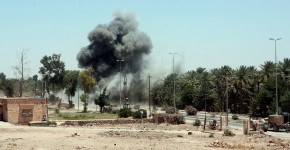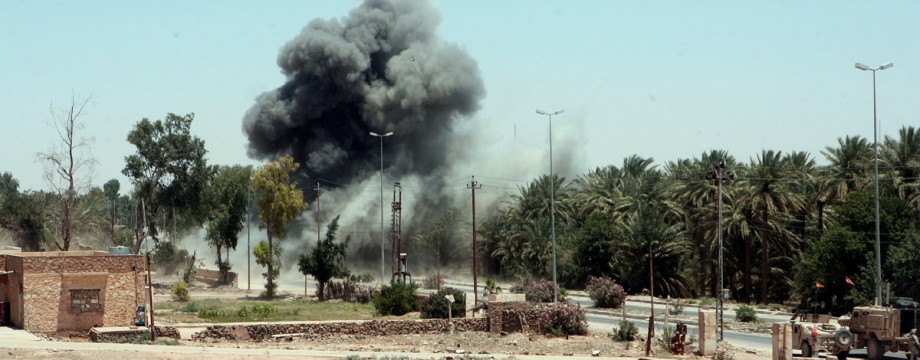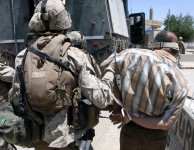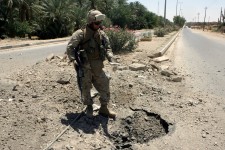 Kilo Company discovered two IEDs in Haqlaniyah and detained two individuals nearby. EOD blew one IED in place and disabled the other. — Source: First Marine Division Press Release.
Kilo Company discovered two IEDs in Haqlaniyah and detained two individuals nearby. EOD blew one IED in place and disabled the other. — Source: First Marine Division Press Release.
Contents
News
Iraq-deployed Marines develop keen eyes for IEDs, suspected insurgents
By Sgt. Roe F. Seigle
1st Marine Division
June 09, 2006
HAQLANIYAH, Iraq (June 9, 2006) — Marines operating in this insurgent-heavy Euphrates Valley city have developed a knack for locating improvised explosive devices – seemingly the number one weapon of choice of insurgents in Al Anbar Province.
According to Cpl. Robert Gaye, a squad leader assigned to the Hawaii-based 3rd Battalion, 3rd Marine Regiment, the Marines are also getting a little help from the local populace in finding IEDs before they are able to do harm to innocent civilians or Coalition Forces.
Everyday Marines and Iraqi soldiers conduct counter insurgency/security patrols in the volatile streets of Haqlaniyah, a city of 30,000 nestled along the Euphrates River Northwest of Baghdad ever watchful for signs that an IED has been placed by an insurgent.
During these patrols, in temperatures surpassing 110 degrees, Gaye says the Marines and Iraqi soldiers are sending out a strong message – insurgency and hostile acts towards Coalition Forces will not be tolerated.
Gaye said he thinks the local populace is beginning to get the message.
Recently, Marines from the Hawaii-based Kilo Company, 3rd Battalion, 3rd Marine Regiment discovered the location of an improvised explosive device placed by insurgents on a highly-traveled roadway May 30, 2006.
While the Marines were enroute to the location, military helicopters spotted two more insurgents placing another IED on the same roadway only kilometers away. The Marines cordoned off the area around both of the IEDs to prevent vehicles and pedestrians from entering the area.
One of the roadside bombs was detonated in place by a U.S. Navy explosive ordinance disposal team, without damaging any nearby houses or military equipment. The second IED was disabled without detonation.
“I think the citizens here are beginning to realize that we are not the enemy and want to cooperate with us,” said Gaye, 23, a squad leader assigned to Kilo Company after returning from a patrol through the streets of Haqlaniyah.
Still, IEDs have accounted for about 50 percent of all U.S. fatalities in Iraq, according to the Iraq Coalition Casualty Count – an organization which tallies U.S. and Coalition casualties based off Department of Defense press releases.
However, the Marines from Kilo Company are not being deterred by the threat IEDs pose, said Gaye, a native of Trafford, Pa.
“Looking for signs of an IED…has become second nature to a lot of the Marines,” said Gaye, who is a veteran of Operation Enduring Freedom in Afghanistan and has had six personal experiences with IEDs. He saw one explode on a roadway in March, the month Kilo Company arrived in Haqlaniyah and assumed control of the battle space. He said no Marines were injured because of the amount of protective armor put on the military vehicles.
“When an IED explodes, you do not have time to get scared,” said Gaye. “Your first thought is you hope none of the Marines got hurt.”
The Marines are developing a keen eye for suspicious individuals. While the Marines were waiting for the explosive ordinance disposal unit to arrive and detonate the IEDs, Gaye and a few of his Marines noticed two men wandering around the area Marines had already cordoned off. Gaye’s instinct told him the men were up to no good, he said.
Gaye and his Marines ordered the men to stop and conducted a pat-search on both the men. Gaye’s suspicions of the men were confirmed when they found large sums of both American and Iraqi Currency, and multiple ID cards on them, among other objects, which cannot be identified in this article due to concerns of operational security. Both were detained and taken to a detention facility for further questioning.
According to 1st Sgt. Vincent Santiago, Kilo Company’s senior advisor and a native of Merizo, Guam, the Marines have discovered more than 20 undetonated IEDs – bombs which could have harmed or killed U.S. and Iraqi troops, as well as Iraqi civilians.
“They use IEDs because they do not have the courage to stand and fight the Marines face-face-face,” said Santiago, 36. “A squad of Marines in Kilo Company could take out all the insurgents in the city in a face-to-face fight.”
However, Santiago said the threat of a small-arms attack is still present. Last month, Marines from Kilo Company engaged in fire fights with several insurgents who embedded themselves in an abandoned hotel. The Marines held their ground and surrounded the hotel until a U.S. military air strike partially leveled the building. Further air strikes destroyed the building altogether and eliminated the insurgents inside.
Marine leaders like Gaye, who lead Marines in patrols through the unpredictable and winding streets of Haqlaniyah, believe their Marines are handling the stress of possible IED attacks and small-arms fire quite well.
“What the insurgents do not realize is the more they fight us, the more motivated the Marines are to fight them back,” said Gaye. “The stress turns into determination on the battlefield.”
The Marines have been able to spot individuals in populated areas – such as marketplaces – who appear suspicious. Usually, it is just the looks on the individual’s face that appears suspicious.
More times than not, Gaye said, their suspicions are confirmed when they search the individuals and find contraband on them, such as fake ID cards and anti-Coalition Forces propaganda. These simple observations, Gaye believes, can save lives and get insurgents off the streets of Haqlaniyah.
Sgt. Mennen Suleiman, a squad leader assigned to Kilo Company, couldn’t agree more.
“We are (detaining insurgents) almost everyday, who might be involved with or assisting in attacks against us,” said Suleiman, a native of Kearney, Neb. Suleiman speaks fluent Arabic and lived in Kirkut, Iraq, until he was 12. He uses his language skills to encourage residents to report attacks before they happen and report individuals who are responsible for the planning and execution of attacks against Marines.
“Marines have been able to see many IEDs up close and personal after we removed and disabled them,” said Gaye. “They know what to look for now and Marines are on the alert. This is what is going to save lives out here.”
Source: First Marine Division Press Release
Photographs
- Mennen Suleiman



